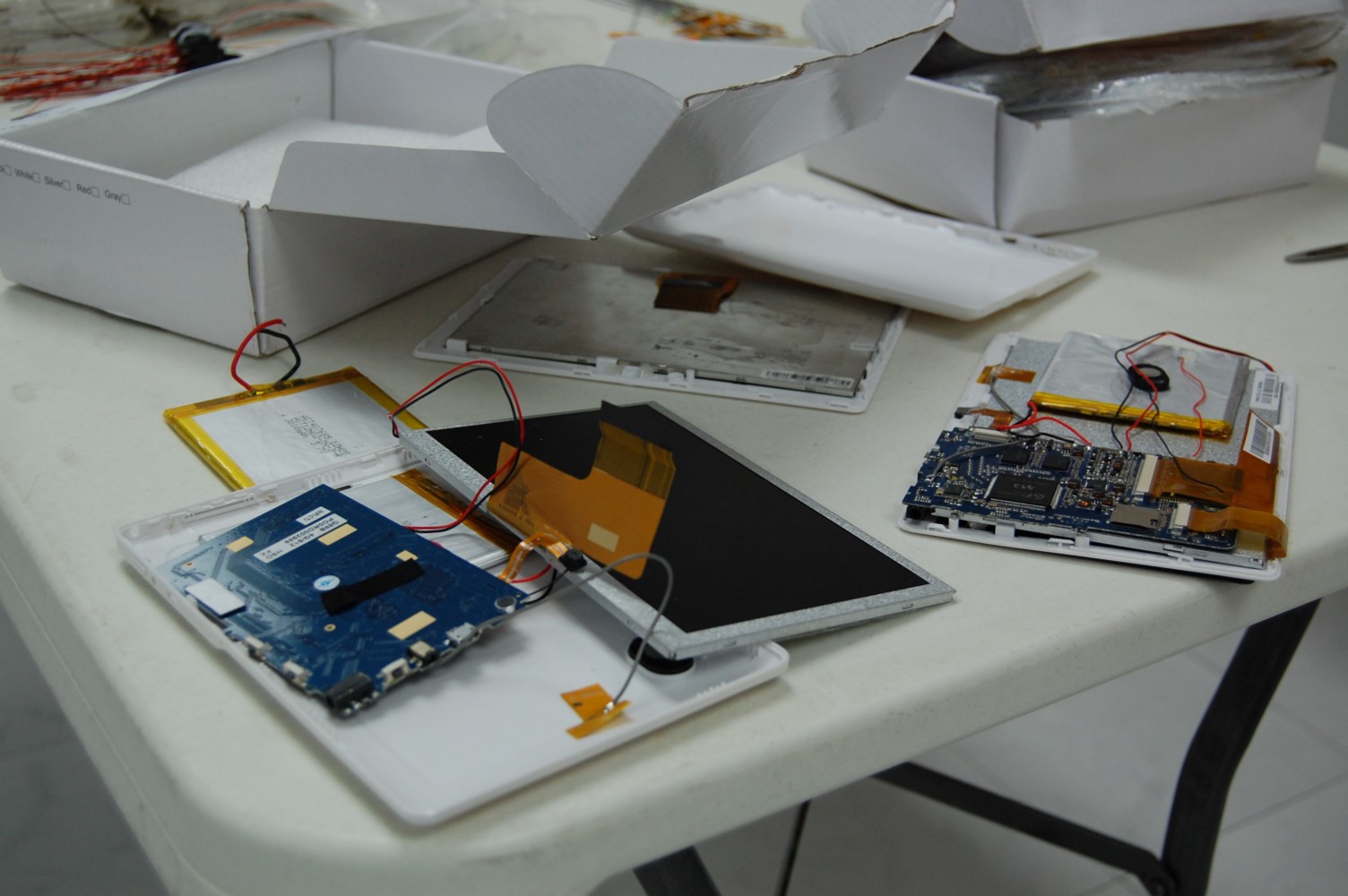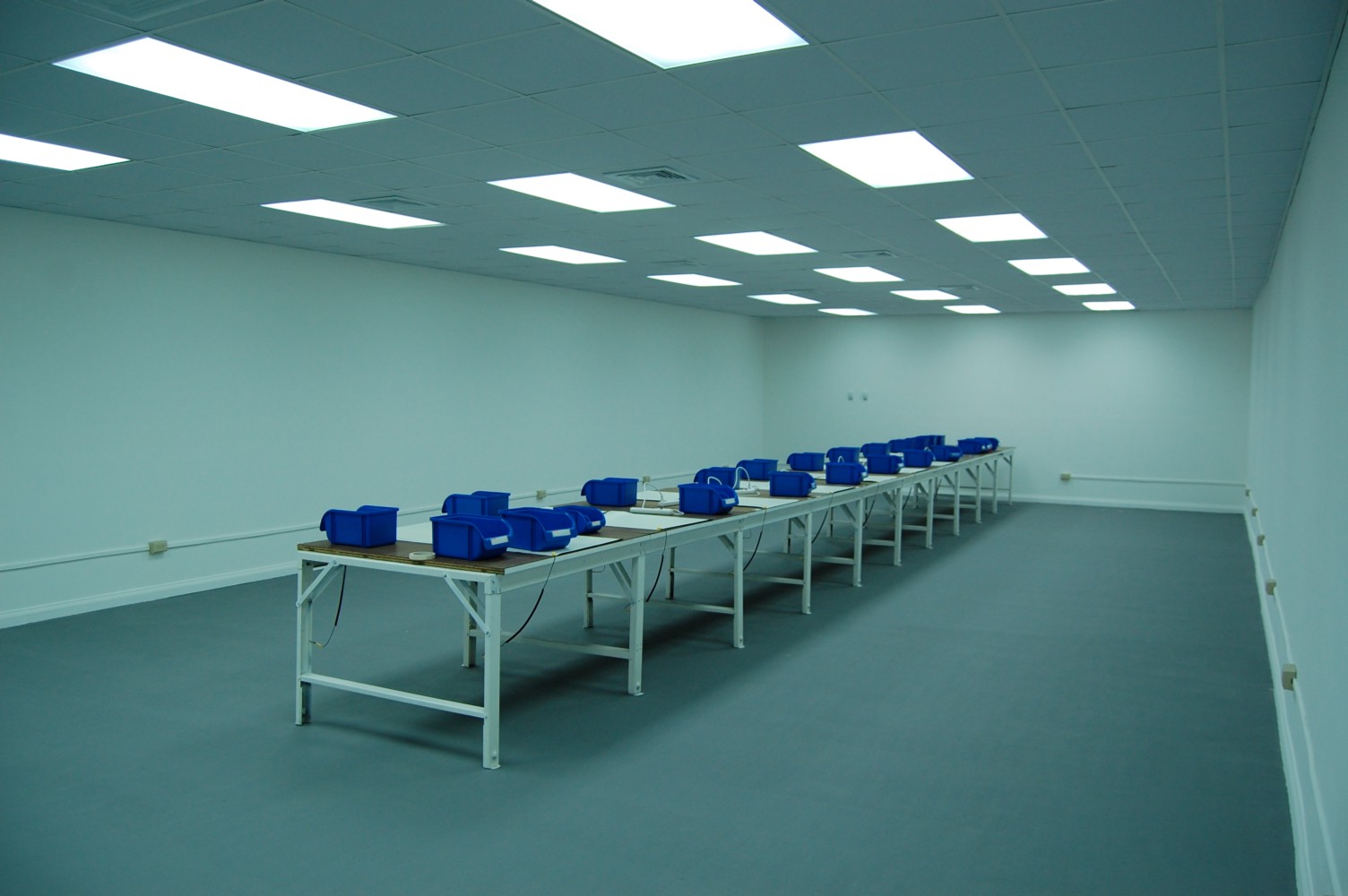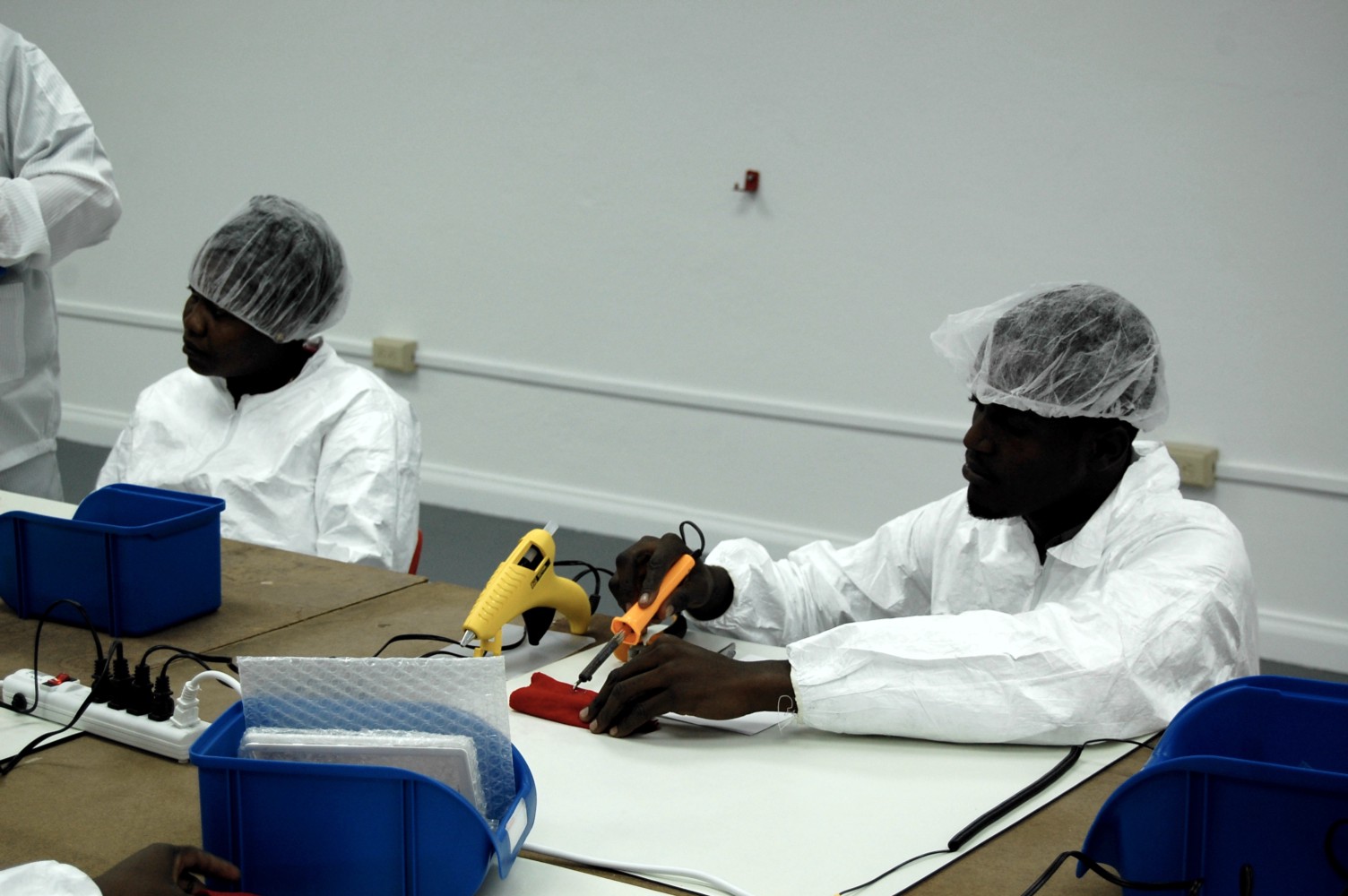Surtab’s Made-in-Haiti touchscreen tablets may help blaze a trail back to electronics manufacturing in the country
 Tate Watkins in Medium for Haiti
Tate Watkins in Medium for Haiti
Marise Fils-Aimé sits at a work table in a brightly-lit, air-conditioned room with hardly a speck of dust to be found. She’s wearing white-coveralls over her clothes, a hairnet, and light-blue booties that cover her Crocs. In front of her lay a pair of wire clippers, a roll of tape, a small electric soldering iron, a glue gun, and a blue tub that contains the plastic parts and electronic components required to assemble a 7-inch touchscreen tablet, which no company has produced in Haiti before.
“I’ve never used a tablet,” Fils-Aimé says. “I think all Haitians would like to have one.”
ONE TABLET PER HAITIAN
In a country with a manufacturing sector known for producing cheap t-shirts, tablet-maker Surtab is a small effort at producing a big-value product. “We really want to re-establish Haiti as a destination for appliances and electronics manufacturing,” says Maarten Boute, Surtab’s 38-year-old Belgian CEO. “We put the bar very high doing tablets.”
For three years, Boute ran the Haiti division of cell phone giant Digicel, the largest company in the country. In 2005, the year Digicel acquired a license to operate in Haiti, there were 500,000 total mobile phone subscriptions. Today, there are 6 million, and Digicel dominates the Haitian telecom landscape. Boute sees huge potential to sell affordable tablets to a growing local consumer class as well as people in other developing countries. In Haiti, the education sector, government, and thousands of NGOs working in the country are also attractive potential customers.
Surtab filled its first order in August—600 Wi-Fi-only tablets for a Kenyan law university whose students will carry around one device instead of reams of legal documents. The company makes two versions of its 7-inch tablets, both of which run the Android operating system. Almost all of the components come from China. The wholesale price of the lower-end Wi-Fi model will be about $70*. The other version, which Boute estimates will wholesale for $129, has 3G capability, dual SIM cards, and runs on a much faster dual-core processor. The company is currently working on an order for a Haitian university and has garnered interest from the Prime Minister’s office, other local schools and companies, and a handful of foreign organizations.
Boute sees tablets as the perfect device for markets like Haiti, where PCs are too expensive for the masses and programs like One Laptop Per Child never lived up to expectations. “Many of the developing world countries have increased their data coverage almost nationwide,” he says, “and it’s the same case in Haiti. It gives an opportunity for connectivity to get out there, to get improved devices.
“Smartphones are a bit small,” he adds. “These mini tablets—the hybrid between a phone and a tablet—are definitely a way to go for this market.”

NOT HAITI’S FIRST ELECTRONICS ASSEMBLY GO-ROUND
In the 1980s, electronics manufacturing was the fastest-growing assembly industry in Haiti. Puerto Rico had begun to phase in the U.S. minimum wage in the 1970s, and the lowest-cost jobs—once manned by Americans, and then by Puerto Ricans—began to move to Latin American countries. There was no cheaper destination than Haiti.
Some manufacturers set up “twin plants”—a factory in Haiti would handle labor-intensive assembly work, then send products elsewhere for final assembly. GTE-Sylvania, TTI Industries, and Westinghouse were among the foreign companies that used factories in the country. But political turmoil followed the 1986 ouster of dictator Jean-Claude Duvalier, and many companies fled. Economic sanctions and a U.N.-backed embargo aimed at removing a military junta further hampered industry in the early 1990s.
Most U.S. firms had simply contracted with Haitian companies that handled everything on the ground. “They didn’t have to worry about importing and exporting, paying electricity, paying rent,” says American Lance Durban, who owns and runs Manutech, an electronics manufacturer that has operated in Haiti since 1984. “It was easier for them to leave when the going got tough, which they did.”
Today, Haitian manufacturers are known for making t-shirts, and low-value garments account for 92 percent of the country’s exports. As the only sizable electronics company that weathered Haiti’s periods of instability, Manutech stands out from the textile manufacturers. “Although we had incorporated in the States,” says Durban, “all of our operations were essentially in Haiti. We had a little more incentive to try to make it work.”
Manutech may not make touchscreen tablets, but the transformers, inductors, and wire harnesses it produces for American and European vendors are a clear step up in value from garment production. And while Surtab’s tablet-assembly might be too ambitious for most companies that would consider doing business in Haiti, it could help demonstrate the potential that exists for other electronics manufacturers. “If you have the technology and ability to put something together,” says Durban, “the other ingredients are here.
“There are a lot of little labor-intensive niches in electronics that could be of interest,” he says. “The big problem is that it’s not a very complete economy. You have to import everything.” But as labor prices increase in China,he adds, manufacturers there are searching for lower-cost alternatives. “Haiti could conceivably be attractive.”

HAITIAN MANUFACTURING AS MORE THAN LOW WAGES
Producing Android tablets flies in the face of the low-value, low-cost theory of manufacturing associated with Haiti, which says that one of its biggest advantages is very cheap unskilled labor. If you’re a company trying to compete in the uber-competitive global textile industry, low-wage labor is a big draw.
“We’re not [just] trying to look for a cheaper place with cheaper labor,” says Surtab CEO Boute, “we’re trying to find a location with a different way of assembling the product, with more respect for the workers.” The company’s 3,000-square-foot facility, with A/C throughout, is a retrofitted section of a larger factory operated by the Coles Group, a Surtab investor and long-time Haitian garment manufacturer. “Currently in Haiti, the minimum wage is roughly $100 a month,” Boute says. “We will be paying slightly more than double that minimum wage, but it’s still below the labor costs that are in China.”
Yet Boute says the effort is as much about finding skilled workers as it is finding cheap ones. “Haitian laborers and assembly operators are actually extremely highly-skilled,” he says. “We were surprised—we put them through vigorous dexterity tests and I.Q. tests, logic tests, basic assembly procedures. Everybody is extremely surprised by the quality of workers that exist here.”
“I didn’t have any other experience in assembly or factory work before,” says Fils-Aimé, 33. “In fact, it surprised me that we could learn a trade in which we didn’t know every detail in such a short time,” adding that it took just a week to learn multiple techniques for soldering electronic boards.
Jean Roody Salomon, 24, says he “didn’t have a real job” when Surtab hired him—he split his time trying to learn English on his own and making beats with friends on a laptop. “Before, I had no [formal] experience in electronics,” he says, “but I was trying to tinker all the time.”
Salomon says that the Surtab job has been a boon for him, and he hopes it will be for his country as well. “I think it’s a very good thing for Haiti,” he says. “I don’t know if there are others who will do this, but I know that here, we’re high tech.”

DOING—AND NOT DOING—BUSINESS IN HAITI
So what keeps more companies, electronics or otherwise, from operating in Haiti? Boute cites logistical challenges to doing business in the country as one drawback, which include an expensive port in Port-au-Prince and dreadful road infrastructure. Surtab, situated in an industrial park near the capital’s airport, avoids some of those downsides because it uses air freight for most shipping.
“Energy costs are very high in Haiti,” Boute adds, describing a challenge that every business in the country faces. Per-kilowatt electricity prices are about three times higher in Haiti than in the United States, and that’s only when grid electricity is available. “This park is one of the only ones that receives energy from the utility from roughly 8:00 a.m. to 4:00 p.m. every day,” Boute says, “but outside those hours we have to run our own generators, which obviously have a much higher cost.”
A handful of tax incentives and other advantages also helped. Like many companies that set up in Haiti, Surtab received an exemption on customs duties and employee taxes – five years, in its case. Boute’s time running Digicel and the Coles family’s generations of Haitian business experience also meant there was much less friction to starting Surtab than there would be for someone brand new to the country. But there was still friction. One example was a delay in the initial production test run because the Chinese engineer who trained employees was denied a U.S. visa. Surtab eventually found a flight that took him from China through Moscow, Havana, and finally to Port-au-Prince.
Still, Diderot Musset is optimistic. Musset, 31, is Surtab’s production manager. Born and raised in Haiti, he studied industrial engineering at a local university and has 10 years experience working in the Coles Group’s garment assembly operation. He believes that the country will still need textiles in the future – the industry can employ thousands people relatively quickly, he says, in a place with massive unemployment. “But in terms of added value to the country as a whole,” he says of Surtab, “to the employees and how we can get them more skills … this is a better deal.
“I think there’s a lot of opportunities that will come from this project,” he adds, “at least in terms of how people see us as a country.
“People always think that conditions are not good, we can’t do this, or we can only do that. I think that this project will show that, actually, we can do anything.”
*An earlier version of this article misstated the estimated prices for Surtab’s tablets. The prices quoted are wholesale, not retail, and can vary order-to-order.

January 20, 2014 at 3:18 pm
is it gonna work as a phone in the U S ?
January 23, 2014 at 12:07 am
Yes, once available in the USA (unlocked) in April 2014, you can use it on any US GSM Carrrier
January 29, 2014 at 8:02 pm
Only 3 words: ‘Surtab is EPIC’
July 24, 2014 at 6:25 pm
Hello Mr. Boute,
I am an American born Haitian who has spent my life making the right connections. I would like to take your tablet to the next level for American Popular Culture. My plan will quickly ramp up production, which means more jobs for native Haitians.
Please contact me as I will be in Haiti, in August, attached to the State Department office in Puerto Rico for an event focused on the Cathedral rebuilding.
I am excited for this opportunity as the welfare of Haiti has always been a passion of mine. Thank you for your time and I await your speedy response. This is truly an EPIC opportunity for Haiti’s economic restructuring.
December 16, 2014 at 8:14 pm
Thank you for your encouraging words! Please free free to reach out to us directly on [email protected]
January 24, 2014 at 9:39 pm
Yes, it works on all GSM and 3G carriers in the world - the surtab is quad band GSM
January 21, 2014 at 11:49 pm
Hello,
Im so surprised that a tablet can be made in Haiti. I congratulate all the staff of Surtab and wish you the courage to work harder to go even further.
Again Congratulations!
Enock
January 22, 2014 at 5:25 am
Amazing! I am proud of what you are doing in Haiti. Other people keep repeating they want to help Haiti, but they choose to take advantages of Haiti in different ways (NGOs, Politics etc… ) instead of investing their money to create new jobs. Most of our upper business class prefers importing goods and others save their money abroad.
Be honest, pay your taxes even if no one really sees what the Government does with it.
Thank you for investing in Haiti.
January 23, 2014 at 2:27 am
How can I order one online?
January 24, 2014 at 9:37 pm
We are in the process of certifying our devices for the US, Canadian and European Union markets. We anticipate to have online sales available as of end of April 2014, but this could be later. In the mean time, you can ask your friends in Haiti to bring you one. Unlocked versions will be on the market as early as March 2014 in the airport free tax area!
January 23, 2014 at 2:43 am
c’est pour moi un plaisir d’utiliser un produit de mon pays ou est ce que je dois order, haiti ou aux etats-unit, j’habite a west palm beach j’ai deja un tablet et quelques computers c’est celle d’haiti que je veux
January 24, 2014 at 9:34 pm
Merci Naky pour vos encouragements! Vous pouvez “order” en ligne a partir d’Avril 2014. En attendant, les surtab sont en vente dans les magasins Digicel en Haiti - ils ont fait un special a 7000 Gourdes (US$159) tax comprises!
January 24, 2014 at 8:21 pm
Mwen pa ka di koman mwen kontan se yon Bel bagay ki akonpli. Mwen di nou kinbe la pa lager. Ayitien Nan lot Bo dlo avek nou. Fe vit voyel pou nou ka achetel
January 31, 2014 at 11:29 pm
Hi
I would like to purchase one online is that possible.
February 18, 2014 at 3:00 pm
Hi,
We expect to have our tablets available online in the USA and Canada by end of April 2014. In the mean time you can ask you family in Haiti to bring you any version from Haiti as we are available in retail stores there.
Kind regards,
surtab
February 18, 2014 at 12:38 am
Man am i so happy about this… i just can’t wait for it to be available to purchase online, I want that 3g hd one, how much is it?
Thanks to who ever made this possible, thank you a million, Haiti ap vanser
February 18, 2014 at 2:59 pm
The 3G HD will be available in Haiti as of March 1st at HTG13950 tax included.
March 18, 2014 at 12:29 am
I am so excited about this…a tablet made in HAITI. I cannot wait to buy one in April for me and tell all of my family and friends about this SURTAB. I am so proud of all of you for your great efforts in this technology advancement in Haiti.
I believe that Haitian all over the world are going to support you. Keep up the GREAT work Surtab staff. God bless always!!!